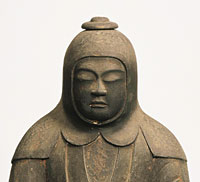Great Throughts Treasury
This site is dedicated to the memory of Dr. Alan William Smolowe who gave birth to the creation of this database.

Saichō NULL
Japanese Buddhist monk credited with founding the Tendai school
"Even with the best of intentions it is difficult to master the way under unfavorable conditions; living in a quiet place in the bosom of nature is the most conducive for practice. It is better to rely, at first, on the place rather than the mind."
"If one abandons all vain disputation one will arrive at the position that dharmas originally neither arise nor perish."
"From hereon in all [temple] dining halls across the land will have an image of MañjuÅ›rÄ« placed especially on the head seat atop of Piṇá¸ola.†It also states, “Is is to forever be a permanent convention.†It is clearly understood that those who spent much time in that country and made no mention of this are, on the contrary, to be ashamed of studying abroad. Also, as to looking at outward appearances unaware of their contents – wouldn't it be better to take everything into account?"
"Buddhist temples are of three types. I. Temples which are strictly MahÄyÄna. These are temples where bodhisattva monks who are new to training reside. II. Temples which are strictly HÄ«nayÄna. These are temples where only the HÄ«nayÄna and vinaya teachers reside. III. Temples where both MahÄyÄna and HÄ«nayÄna practice together. These are temples where bodhisattva monks who have trained for a long time reside. Now in the Tendai Lotus School the annual ordinands [candidates for ordination] are all new practitioners who have all directed their minds to the MahÄyÄna and for twelve years will be made to reside deep in the mountains at the temple Shishu Sanmai-in 四種三昧院. Upon completion of their training they will provisionally receive the lesser [HÄ«nayÄna] precepts as it benefits others and they will be permitted to provisionally reside in a temple where both [MahÄyÄna and HÄ«nayÄna] practices are carried out."
"If one be a son of the Buddha (buddha-putra), one must not intentionally eat any meat as it severs the innate seed of great compassion. Sentient beings will see [a meat eater] and flee. It is for this reason that all bodhisattvas must not eat the meat of any sentient being. There are immeasurable transgressions when one eats meat. If one intentionally eats [meat], one violates a minor defiling transgression."
"Now you speak of ten heavy and forty-eight light precepts, which are to be regarded as the great monastic precepts of the Mahayana. In what sūtra is this taught? The ten heavy precepts in the Brahma Sutra are as follows. 1. Not killing 2. Not stealing 3. No lasciviousness (celibacy) 4. No false language 5. No selling of liquor 6. No discussion of the faults of other sangha members 7. Not praising oneself and criticizing others 8. Not harming others through stinginess 9. Not accepting the repentance of another while maintaining one's anger 10. Not slandering the Triple Gem (Buddha, Dharma and Sangha)"
"The Lotus SÅ«tra refers to one seeking the lesser fruit and states, 'Does not go near.' None of the bhiká¹£us of this country seek the lesser fruit."
"There are two Buddhist precept [sets]. I. The precepts of the great monks of the MahÄyÄna, systematizing ten heavy and forty-eight light precepts. To be regarded as precepts of great monks. II. The precepts of the great monks of the HÄ«nayÄna, systematizing two-hundred and fifty precepts. To be regarded as precepts of great monks."
"Those monks who went to the Tang to study before spent much time in that country and all were without mention of this, and now you write stating that in Dali 4 (769) they initiated a MahÄyÄna high seat where the bodhisattva MañjuÅ›rÄ« is placed in all temple dining halls across the land. From then until Zhenyuan 22 (806)3, exactly thirty-eight years have passed. It corresponds to Enryaku 25 (806) in the country of Great Japan. As they say, 'Looking at outward appearances unaware of their contents.'"